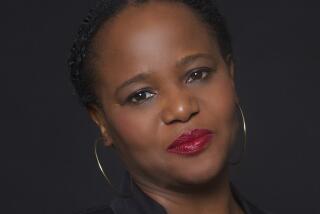John McPhee’s new book gets personal
Reporting from Princeton, N.J. — There’s a fault line opening in John McPhee. After 28 books and countless essays, he is giving us, bit by bit, a more personal sense of who he is. In a recent, beautiful piece for the New Yorker, he combined an essay on pickerel with memories of his father’s death and a lasting image of his father’s bamboo fishing rod. The piece took many readers by surprise -- not the style, which was the same seamless combination of carefully chosen details and information, but the presence of the author, blinking in full glare. According to McPhee, who turns 79 next month, he was as surprised as anyone to find himself hooked by memories, exposed.
McPhee’s new collection of essays, “Silk Parachute” (Farrar, Straus & Giroux: 228 pp., $25), is named for a marvelous toy his mother gave him for his 11th or 12th birthday, and it contains more pieces of personal history: the time he didn’t finish his sandwich and his mother ran after him and made him eat it; the time he went to a football game with his father and realized, looking up at the press box, that he wanted to be a writer; the pride he feels watching his nine grandchildren, to whom he dedicates the book.
In the past, McPhee’s strategy had been to explain a little bit about why he is writing -- about oranges, tennis, trains, geology, fish, Bill Bradley, David Brower, you name it -- and then get out of the frame. Sure, he leaves traces: We feel we might know his voice if we heard it in a coffee shop, and we can taste his presence, his influence over a generation of journalists and essayists. But we would not recognize him if he were seated next to us.
McPhee is very shy. He doesn’t do many interviews and he has written about his own clammy-handed nervousness interviewing others or speaking in public. For 35 years, he has taught a writing seminar two out of three spring semesters at Princeton, the university he attended, in the town where he grew up. That’s about it for public speaking.
Centered in Princeton
Princeton is McPhee’s “fixed foot.” From here, he has traveled the world writing stories about “real people doing real things.” On a winter afternoon, snow threatening, he gives a tour of the campus. Nassau Hall, built in 1756, served as the United States Capitol for six months. George Washington presided over Congress here. Reunion Hall is where John F. Kennedy lived as a freshman, and here is a building where a ghostly John Nash can still be seen. Then there’s the personal tour: the church where his mother took him after he was caught playing poker all night in college; John Henry House, where he has taught since 1975.
McPhee’s office is in a fake medieval turret high in the geology building. There are five vertical windows perfect for crossbows. One climbs past globes and rock samples and maps of the universe to arrive in the room where he writes most days and meets with students. “Don’t forget to lock your door when you leave to go home,” reads a note one of McPhee’s four daughters, Martha, wrote in 1975. The geologist Eldridge Moores (about whom McPhee writes in “Assembling California”) worked on his PhD in this room in the 1950s. When McPhee first took possession, there was no heat but that was all right -- he just left the door open and the heat was sucked up from the lower floors. His computer, named Isobel after one of his grandchildren, looks like it might have come with the room.
McPhee admits that he is writing more about his memories. The new collection’s title essay, about his mother, was written in 1996, a year before she died at age 100. In 1984, within a few months of his father’s death, he jotted the words “bamboo rod” on a piece of paper, which became a folder, which became the essay that appeared in the New Yorker. McPhee, who normally bicycles 15 to 16 miles every other day for exercise and is rarely idle, blames recent hand surgeries, with the attendant resting and medication required, for the fault line that has opened up. “I just started writing. I guess I’m not used to all that spare time,” he says, surprised. “I usually know where I’m going with a story. A novelist can feel her way with a story, but that’s not the case in nonfiction. It’s a central theme of the course I teach: Know where you’re going.”
Two of McPhee’s four daughters, Jenny and Martha, are novelists; Laura is a photographer; and Sarah is an architectural historian (“the real scholar,” he says). Martha, who has written quite a bit about her childhood, has encouraged her father to write more autobiographical pieces, to open up and enjoy himself. He marvels at his writing daughters. “I’ll call Jenny up and say, do you have any ideas for your next novel? ‘I finished it last week,’ she’ll say. She’s like me. She believes in fait accompli.”
McPhee is slender, dressed in a deep blue button-down shirt, a fleece vest and running/hiking shoes. He can’t explain the memories. “Ideas go by by the zillions,” he reflects. “What makes us fasten on one?” Many of his interests were formed at a summer camp called Keewaydin, where his father went each summer as camp doctor; McPhee would spend his time canoeing and swimming. He has written about Keewaydin in the past, and returns there in this new collection, in an essay titled “Swimming With Canoes.” Here, he remembers capsizing in fast water in a Vermont gorge, getting his foot stuck in the stern and riding safely in the air pocket created by the overturned canoe.
McPhee has described writing as “mind-fracturing, self-enslaved labor.” Each day, he says, brings a “new form of writer’s block.” He elaborates: “You suspend the normal world to reproduce the normal world. It is a suspension of ordinary life.”
And the writer loves language, strange words, the names of things. McPhee spent 20 years on his geological portrait of America, “Annals of the Former World,” for which he won the Pulitzer Prize in 1999. He has had a great deal of fun with the language of geology, as well as that of sports, which infuses his first book, “A Sense of Where You Are,” about basketball player Bill Bradley, and his 1969 book on tennis, “Levels of the Game.”
Beyond language, he hopes for good characters and a dramatic climax. He also places a high priority on getting the facts straight. “People say the line is blurred,” he says. “But a fact is either checkable or it isn’t.”
McPhee writes three or four drafts of each piece, spending about two years on the first draft, four months on the second, one month on the third and one week on the fourth. He writes everything down. During a visit to the Netherlands with Martha’s family, one of her children asked, “Why was granddaddy writing all those notes?”
“The creative person in this process,” McPhee says, “is the reader, by a long shot. The writer supplies three or four words, but the reader makes the picture.” And McPhee values his readers. He will not condescend to them. He has a horror of the obvious, the not subtle, the over-explained.
A home at the New Yorker
This is one reason McPhee was fortunate to find a home, in 1965, at the New Yorker. He acknowledges his great luck, having William Shawn as his editor, for a magazine that had just published John Hersey’s “Hiroshima” and Rachel Carson’s “Silent Spring.” He has sympathy for today’s students who have fewer and fewer venues. As for newspapers: “Every morning I walk down the driveway to pick up the newspaper. I’m an older person. And I’m still walking up the driveway.”
As for posterity, “nothing is forever,” says the chronicler of geologic time. He doesn’t think about his papers or his legacy. “If everybody saved everything,” he says of his many drafts (which he calls “entrails”), “the world would be cluttered up with stuff.” He gets as close to heated as one could expect to see in a quiet man. “Preservation of the creative process,” he mutters. “Enough to sink a ship.”
He follows an elaborate warren of hallways through various buildings -- paleontology, microbiology, biology, and passes the building where Lewis Thomas worked. “He once wrote me a note,” McPhee recalls, “describing a day when, as a young student, he thought he was dying and went to see my father, who examined him and said, ‘Thomas, you are hung over. Go back to your room.’ ”
McPhee might be scornful of posterity and humble about longevity, but he remains awed by words. When his father lay dying in a Baltimore hospital, McPhee “began to talk,” he wrote in the New Yorker. “In my unplanned, unprepared way, I wanted to fill the air around us with words, and keep on filling it.”
“The thing that will not go away,” McPhee tells his students, when asked about the future of reading and writing, “is books. Everything I’m doing is rooted in the idea that there are no two writers alike; no one will write the way you do. You are dealing with yourself. The voice you are fighting to develop is your own.”
Salter Reynolds is a writer in Los Angeles.
More to Read
Sign up for our Book Club newsletter
Get the latest news, events and more from the Los Angeles Times Book Club, and help us get L.A. reading and talking.
You may occasionally receive promotional content from the Los Angeles Times.






